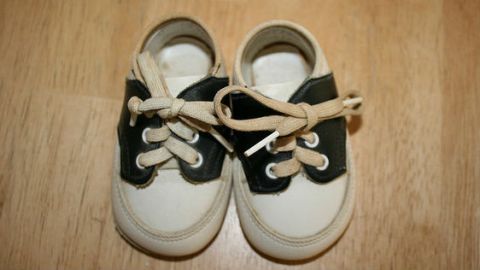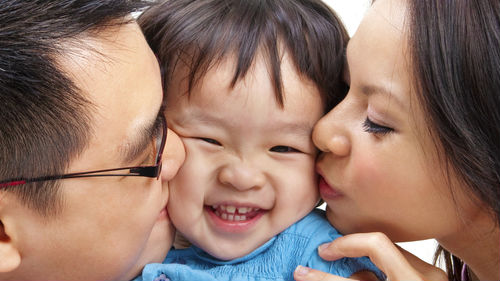Why Is there no “Fatherhood War?”

A childfree friend of mine once memorably wondered why moms are so “judge-y” toward each other.
I’m loath to reinforce the rhetorical overkill of calling this judge-y state the “mommy wars.” For one thing it belittles the literal war we’re still waging in which actual lives and limbs are being lost.
All the same, moms have been known to swipe at each other with catty claws unsheathed.
My experience is that most mothers aren’t interested in judging other mothers, but that a substantial number are alternately evangelical about their own parenting philosophies, or judgmental toward other mothers, for reasons not entirely clear.
My child’s a tween, and I’ve been AWOL from the war for many years. When my son was a baby and toddler, however, I had a salaried job that was important for the family budget—yet I worked part-time and mostly out of a home office, so I straddled the two main camps in the faux war.
As an accidental double agent in the mommy wars, I was privy to casual judgments passed by both “sides” against the other, each side claiming me as their own. The comments, while toss-away, were fairly predictable, and hurtful, so I won’t repeat them here.
It’s become almost gestural for political operatives to fan the flames of dissension on the one hand and to urge a truce on the other.
After her comment that Ann Romney “hadn’t worked a day in her life,” Hilary Rosen walked it back by asserting an ideal of sisterhood—that moms all really have the same interests—and then you plea that we should pull together, support better maternity leave, quality day care, and family-friendly policies.
It’s a happy, inoffensive premise but I’ve got my doubts. Are the motherhood wars really an artifact of bad day care and maternity leave policies? It’s not my sense that the “war” really lives and festers there.
I agree unconditionally that we need work cultures that acknowledge family caregiving. Scholar Joan Williams summarizes it best when she writes that we have a culture that (still) imagines the “worker” anachronistically as a middle-aged, middle-class man who lives in the suburbs with a wife who cooks and takes care of the kids full time.
But in the U.S., the motherhood war’s most voluble combatants are socioeconomic peers. And they enjoy a fair amount of privilege. The war rages most nastily among middle-class, professional, or creative-class moms who have latitude in parenting.
It’s not happening because women have such lousy choices. It’s a civil war that’s happening among a group of women that has pretty good choices, and that’s fought precisely over the different ways that they exercise those choices and privileges.
Who chooses to pursue the high-powered work; who believes that breastfeeding is the sine qua non of motherhood; who thinks that day care is fine versus those who don’t; who believes in natural childbirth, or vaccinations; who believes in one of scores of parental philosophies to choose from in the quest for parental brilliance.
So family-friendly policies—while absolutely critical on their own merits—are an oblique rebuttal the mommy wars.
At this point, it’s useful to consider why we don’t have a fatherhood war. Certainly, we’ve got a variety of fathering styles over which men could judge each other often enough that their judgments could coalesce into a cultural trope known as a “Daddy War.” Yet this hasn’t happened.
Last year, the alternative bedtime story, Go the F to Sleep, was a huge seller. It’s a very funny book, and true to life about the frustrations of early fatherhood.
I thought at the time, though, that the book might have been differently received if it had been written by a mother.
A dad could pull it off—he wrote and presented it confidently—but would a mom have gotten tarred with the always-handy Bad Mother brush, or criticized, if she’d written so openly about frustrations? (Indeed, when feminist author Naomi Wolf published a book that tried to puncture the myths of maternal bliss, she was eviscerated by other moms on the “Oprah” show, and the episode generated what was, at the time, the most mail that Oprah had ever received in response to a show).
Fathers are engaged in active parenting today like never before. But moms still bear the psychological brunt of parental identification and responsibility in this Guilted Age of parenthood. So maybe we’re more sensitive than dads to peer judgment, and more insecurely compelled to judge.
Another reason we don’t have a daddy war is perhaps because since pre-feminist days—really, since the dawn of civilization—boys and men have been encouraged to view themselves as individuals who define their own paths, and who have choices in life. Maybe they apply that spirit to more active parenthood, too. They wouldn’t expect, or care, to have other dads be and act just as they do. But for women, another mom’s decisions can feel like a rebuke.
So on father’s day, I’m thinking about a lesson I can learn from my male contemporaries. It’s important to have a spirit of self-confidence and self-assurance—even the individualist’s insouciance—about the parenthood trip.
This confidence and nonchalance about what boils down to our own agency, our capacity to make decisions about work and family (adulthood, that is), might come more easily to dads. Being liberated means learning to have some graciousness, good-sport manners, and charm about the decisions you’ve made, and had the hard-fought privilege to make.





